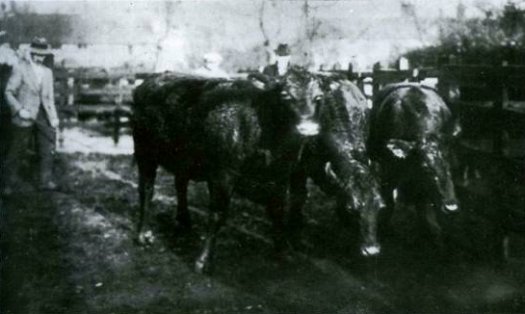
The Markets
As mentioned in another chapter, Watton had five annual fairs for cattle and sheep for many generations and since 1870, and possibly much earlier, a cattle sale was held for several years at the rear of the "George Hotel" on alternate Wednesdays. Hall & Palmer's started their weekly stock markets at their Norwich Road sale yard in 1902. Bet ween the wars it became one of the largest cattle markets in the county apart from Norwich and King's Lynn. At their weekly sales it was not unusual for them to have 200 cattle and at the special monthly sales somewhere in the region of 400 cattle and 300 pigs would be penned with lesser numbers of sheep and a few horses. Throughout the year the weekly poultry sales attracted many hundreds of chickens and rabbits, with a dozen or two goats and guinea pigs. Large quantities of butter, eggs and vegetables were also auctioned. The annual fat stock and poultry sales were the highlight of the year with the prize-winning bullocks fetching high prices and a week later their prime joints were displayed in the butcher's shops, together with their prize-winning cards. Preparations for their Christmas Poultry Sale went on for a week or two before the auction day, with hundreds of temporary pens being erected on the large sale meadow to accommodate thousands of fat turkeys and geese and the permanent pens were filled with fat chickens. Barnham's Stock sales started in the "Bull Hotel" yard in 1900 and they moved to the Norwich Road site, where Noel Abel now has his furniture sales, in 1912. They sold fewer cattle, but their en tries of pigs were probably higher than Hall & Palmer's, while weekly numbers of chickens, eggs, butter and vegetables was usually well in access of Hall & Palmer's with some 20,000 to 25,000 eggs being handled each week. Half a dozen Jews would come down on the train from London and competition between themselves and local buyer, George Page, was so keen that it provided much humorous entertain ment with the likes of Grossmein and Honingstein gabbling away until the auctioneers gavel came down for the last lot. Then it was all hustle and bustle to get the fowls into crates and taken up to the station in time to catch the train for London. |

